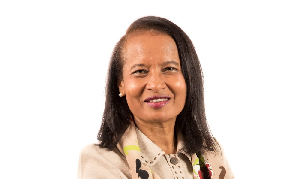 Geraldine Fraser-Moleketi, Chairperson of the Thabo Mbeki Foundation
Geraldine Fraser-Moleketi, Chairperson of the Thabo Mbeki Foundation
At the opening of the first-ever African Peace & Security Dialogue in Johannesburg, Chairperson of the Thabo Mbeki Foundation, Geraldine Fraser-Moleketi, delivered a sobering message: the African Union’s peace and security architecture is faltering in the face of growing conflict on the continent.
Addressing a gathering of African leaders, international delegates and representatives of civil society on October 4, 2024, Fraser-Moleketi referred to the six African countries currently suspended by the African Union because of military takeovers as an indication of the AU's inability to stem the tide of conflicts.
She questioned whether the peacekeeping mechanisms of the AU, designed close to twenty years ago, are still fit for purpose within an increasingly complex security landscape.
"The AU’s peace architecture has shown to be ineffective and rudderless," Fraser-Moleketi remarked, underscoring the inability of continental institutions to respond to the escalating conflicts that have engulfed parts of Africa.
From civil wars in Sudan and South Sudan to famine and displacement in Somalia, South Sudan, and Ethiopia, she painted a grim picture of a continent struggling with both internal and external pressures.
However, the critique by Fraser-Moleketi did not stop at the AU. She noted the challenges from outside in the Russia-Ukraine conflict as one example and how global geopolitical struggles reach Africa, thereby making it susceptible to external interference and further complicating the security issues.
She noted that Africa cannot be blind to the global situation as she urged the continent to put in much effort to strengthen structures so that Africa would be ready to resist those challenges blowing now from inside and outside.
One of the central questions explored during this session was whether the political will to see the reforms through existed among African leaders.
According to Fraser-Moleketi, African countries must find the courage to deal with issues of peace and security with the same energy and determination used during the struggle against colonialism and apartheid.
This conference, from 4 to 6 October, tries to achieve more than merely diagnosing the security problems of Africa. Organized by the Thabo Mbeki Foundation, this dialogue aims to create solutions for such problems; therefore, a reform in mechanisms of the AU in that direction was within focus and empowering the African states to assume ownership of their efforts toward peace.
The discussion will feature a review of the existing peace strategies, consideration of AU partnerships with the UN Security Council, and a search for resource mobilization on matters of peace on the continent.
Fraser-Moleketi called on the participants to exploit the platform not only to debate conceptual positions but also to commit themselves to concrete action points that can be taken forward at national and regional levels. The meeting, she said, will also witness the release of two important publications - a review of the Tana High-Level Forum on Security in Africa and the booklet on the AU High-Level Panel for Sudan and South Sudan.
The organizers of this event would like to see this dialogue contribute to a revitalized effort toward such improvements in Africa's peace mechanisms, ensuring that institutions like the AU are empowered to bring about change in the security challenges of the continent.
As aptly put by Fraser-Moleketi, questions still linger: “Do we, as the African leaders and citizens, have the will to prioritise peace and security? Do we have the courage to endow our actions with the same moral and political energy that so many of our ancestors used in the struggle against colonialism and apartheid? If we do, then this dialogue must become more than a meeting of minds. It must be the starting point for an African-led movement towards sustainable peace and security.”
The outcome of this debate will settle the future direction taken by African-owned peace and will provide a seminal point, against which to chart the AU's capacity for reform and leadership.
Day 1 of the event was graced by the former President of South Africa, H.E. Thabo Mbeki; Minister of Foreign Affairs of Zimbabwe, Hon. Frederick Shava; Minister of Foreign Affairs and East African Cooperation of Tanzania, Hon. Mahmoud Thabit Kombo; and Prof. Funmi Olonisakin, Vice President of King's College London, among other dignitaries.
BB